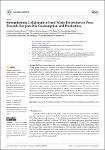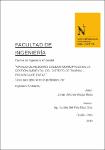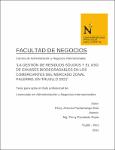Mostrar el registro sencillo del ítem
Strengthening collaborative food waste prevention in Peru: towards responsible consumption and production
| dc.contributor.author | Cordova-Buiza, Franklin | |
| dc.contributor.author | Paucar-Caceres, Alberto | |
| dc.contributor.author | Quispe-Prieto, Silvia Cristina | |
| dc.contributor.author | Rivera-Garré, Andrea Pierina | |
| dc.contributor.author | Huerta-Tantalean, Lucero Nicole | |
| dc.contributor.author | Valle-Paucar, Jesús Enrique | |
| dc.contributor.author | Ponce de León-Panduro, Carla Vanessa | |
| dc.contributor.author | Burrowes-Cromwell, Toni | |
| dc.date.accessioned | 2022-05-09T17:46:54Z | |
| dc.date.available | 2022-05-09T17:46:54Z | |
| dc.date.issued | 2022-01-18 | |
| dc.identifier.citation | Cordova, F., ...[et al.]. (2022). Strengthening collaborative food waste prevention in Peru: towards responsible consumption and production. Sustainability, 14(3). https://doi.org/10.3390/su14031050 | es_PE |
| dc.identifier.uri | https://hdl.handle.net/11537/30272 | |
| dc.description.abstract | Inefficient management and handling of organic waste generated by the food service sector is a big global challenge. In addition to the negative environmental impacts of food waste, the effect of the amount of food that is wasted when it is not handled properly is even more alarming. This is particularly when we witness the millions of people who suffer from lack of food and malnutrition. The objective of this research is to examine the situation of organic waste management in food services in the cities of Lima and Tacna in Peru. Using a quantitative methodological approach to waste management, a questionnaire was administered to a sample of 67 restaurants in both cities. The survey results suggest that the restaurants do not carry out the separation or reuse of organic waste. Furthermore, the main methods of disposal include providing surpluses to the staff and sending organic waste to the sanitary landfill and slaughterhouses. There is also a lack of awareness and training about the importance of organic waste management. From the restaurants interviewed, although around 60% claimed to segregate them, only 28% measured organic waste using a manual control and 18% indicated that they weighed the waste for management purposes. As a corrective measure for this deficiency, the production of an awareness video was created to improve decision-making and support change. | es_PE |
| dc.format | application/pdf | es_PE |
| dc.language.iso | eng | es_PE |
| dc.publisher | MDPI | es_PE |
| dc.rights | info:eu-repo/semantics/openAccess | es_PE |
| dc.rights | Atribución-NoComercial-CompartirIgual 3.0 Estados Unidos de América | * |
| dc.rights.uri | https://creativecommons.org/licenses/by-nc-sa/3.0/us/ | * |
| dc.source | Universidad Privada del Norte | es_PE |
| dc.source | Repositorio Institucional - UPN | es_PE |
| dc.subject | Residuos orgánicos | es_PE |
| dc.subject | Administración de desperdicios | es_PE |
| dc.subject | Consumo responsable | es_PE |
| dc.subject | Desarrollo sostenible | es_PE |
| dc.subject | Servicios de alimentación | es_PE |
| dc.subject | Restaurantes | es_PE |
| dc.title | Strengthening collaborative food waste prevention in Peru: towards responsible consumption and production | es_PE |
| dc.type | info:eu-repo/semantics/article | es_PE |
| dc.publisher.country | CH | es_PE |
| dc.identifier.journal | Sustainability | es_PE |
| dc.description.peer-review | Revisión por pares | es_PE |
| dc.subject.ocde | https://purl.org/pe-repo/ocde/ford#5.02.04 | es_PE |
| dc.description.sede | Los Olivos | es_PE |
| dc.identifier.doi | https://doi.org/10.3390/su14031050 |






